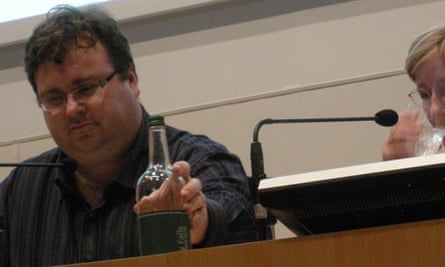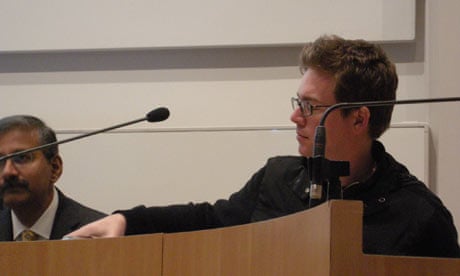In digital media, as in fortune-telling, the future is pretty much treated as part of the present. "What is the next big thing?" is a question everyone who works with the internet asks continually. But after several years of boom, the question of what comes after social platforms is no longer so remote.
Luckily, some experts just gave us answers. On Monday evening, the Said Business School in Oxford had invited some very bright and successful entrepreneurs who spoke in front of a packed alumni audience as Silicon Valley came to Oxford for the ninth year. The event was chaired by the very lively and assertive Frances Cairncross, rector of Exeter college.
The first expert to confront us with an answer was Peter Thiel, who co-founded PayPal and made early investments in Facebook and LinkedIn. He reminded us to evaluate first what stage we're at with social networks. "With digital technology there is a tendency to underestimate when things are getting mature, but to understand the financial and technological situation it is really important," he explained.
"If you look back from today, it becomes clear that in 2002 even experts missed that Google had already become the main search engine. If people would have understood back at that time that there was no chance any more to outrun Google, some investments would have been different. But back at these days we didn't discuss Google like this."
He asked the audience: "Where in the history of social network are we? Are we at an early stage, and most of the companies won't be around in a few years' time? Or are we in a late stage, when companies like Facebook, LinkedIn or Twitter are really mature and will be in business to stay?"
Then he floated a bigger and more daring possibility – that the development stage of the internet itself has come to an end: "Are we at the end of innovation of social networking? And is social networking the last innovation of the internet?"
"See, we went from the development of telecommunication to the internet and from the internet to social networking. Maybe there is no innovation left any more, and we have to look for it in a completely different direction. Maybe we have to go back to space and science fiction novels."
Being the CEO of Twitter, Biz Stone was quite sure that for him that wasn't the case. After having said to reporters earlier in the day that he was not thinking about selling the company but would rather go to the stock market if necessary, he started to relax the atmosphere, joking that he felt he was on a Seinfeld panel asking: "Social networks, what's the deal?"
Then he shuffled himself out of the responsibility of answering that question, stating that Twitter isn't even a social network. "Twitter never asked anyone to have a permanent relationship among each other. Indeed, we even changed the question we used to asked on Twitter 'What are you doing?' last week in 'What's happening?' because everybody was ignoring it anyway."
"I refer to Twitter as an information network rather then a social network. And here I believe in the trend of openness. Using an open technology, creating an open platform, and being more transparent that is where we are heading."
Stone believes that technology has a political impact that shouldn't be underestimated. Referring to Twitter's involvement in the Iranian election protests, he said: "On a large scale, the open exchange of information can even lead to positive global impact. If people are more informed they are more engaged, and if they are more engaged they are more empathic. They are global citizens, not just a citizen of a nation."
Ram Shriram, a founding board member of Google and one of the search giant's first investors, pointed discussion in a different direction. "Combining social and mobile – there is a new wave of oppportunities coming up, a growth of users, so mobile internet is clearly the next major computing cycle. And this time this didn't start in the US, but in Asia and Europe from where it is going to the US," he said.
"In China and India people always used their mobile as their PC; that was the way they accessed data. We face powerful new waves of publishing with YouTube, Facebook and Twitter, and the social sits in the middle of this. There is a creation and production of information. There will be new distribution and consumption patterns which will impact society. This might even make newspapers even more irrelevant."
Then he made a number of predictions: "Facebook will replace email for a new generation. The chat is moving to a multimedia format. Gaming will move from devices directly to the internet. And Apple has a big future because of its strong mobile focus."
Otherwise, the coming mobile business opportunities would be taken by small young companies, because it was easy and cheap to build these applications, which would either fail or succeed at speed. Shriram also believes that advertising will grow less important: "Users tend to pay on the mobile internet for premium services."

LinkedIn founder Reid Hoffman, who graduated from Stanford University and Oxford with a master's degree in philosophy, tackled Thiel's social-networks-are-the-end thesis head on. "I actually think we are just beginning to see how people launch the eventualities of social networks into their life," he said, reminding the audience of the way that mobile phones had grown from a tool for bankers to a part of everyone's life.
"I think the phenomenon of the online relationship empowers our personal and professional life. You might think 'Who wants to consume all this useless information?', but with some information it is like with ice cream. It is not nutritious, but people still eat it. And to understand what will go on, you will have to switch that to business models."
For Facebook, Last.fm and Flickr applications, he argued, using live data would become much more important. "Today you have everyone generating data.I think these massive amounts of data are perfect for new applications. There will be a lot of new applications come out of it. Obvious ones, like whom you should meet professionally, and some we don't even thing about. There will be interesting mash ups liked LinkedIn and Twitter."
An Oxford lecturer, Dr Kate Blackmon put this in a nutshell in saying that the future was not about crowd sourcing but crowd filtering.
So is social media over? There are now enough social networks to fill all the obvious niches; but making use of the stream of information that pours into them is something we've only just started.

Comments (…)
Sign in or create your Guardian account to join the discussion